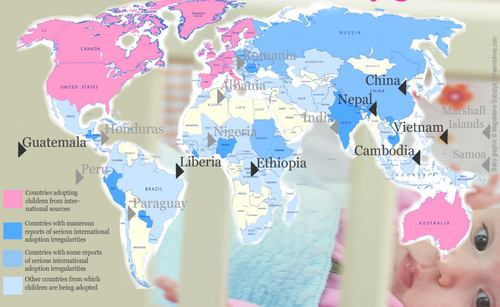By Patrick Appel
A disturbing report from E. J. Graff:
Westerners have been sold the myth of a world orphan crisis. We are told that millions of children are waiting for their “forever families” to rescue them from lives of abandonment and abuse. But many of the infants and toddlers being adopted by Western parents today are not orphans at all. Yes, hundreds of thousands of children around the world do need loving homes. But more often than not, the neediest children are sick, disabled, traumatized, or older than 5. They are not the healthy babies that, quite understandably, most Westerners hope to adopt. There are simply not enough healthy, adoptable infants to meet Western demandand there’s too much Western money in search of children. As a result, many international adoption agencies work not to find homes for needy children but to find children for Western homes.
Since the mid-1990s, the number of international adoptions each year has nearly doubled, from 22,200 in 1995 to just under 40,000 in 2006. At its peak, in 2004, more than 45,000 children from developing countries were adopted by foreigners. Americans bring home more of these children than any other nationalitymore than half the global total in recent years.
Where do these babies come from? As international adoptions have flourished, so has evidence that babies in many countries are being systematically bought, coerced, and stolen away from their birth families. Nearly half the 40 countries listed by the U.S. State Department as the top sources for international adoption over the past 15 yearsplaces such as Belarus, Brazil, Ethiopia, Honduras, Peru, and Romaniahave at least temporarily halted adoptions or been prevented from sending children to the United States because of serious concerns about corruption and kidnapping. And yet when a country is closed due to corruption, many adoption agencies simply transfer their clients’ hopes to the next “hot” country. That country abruptly experiences a spike in infants and toddlers adopted overseasuntil it too is forced to shut its doors.
